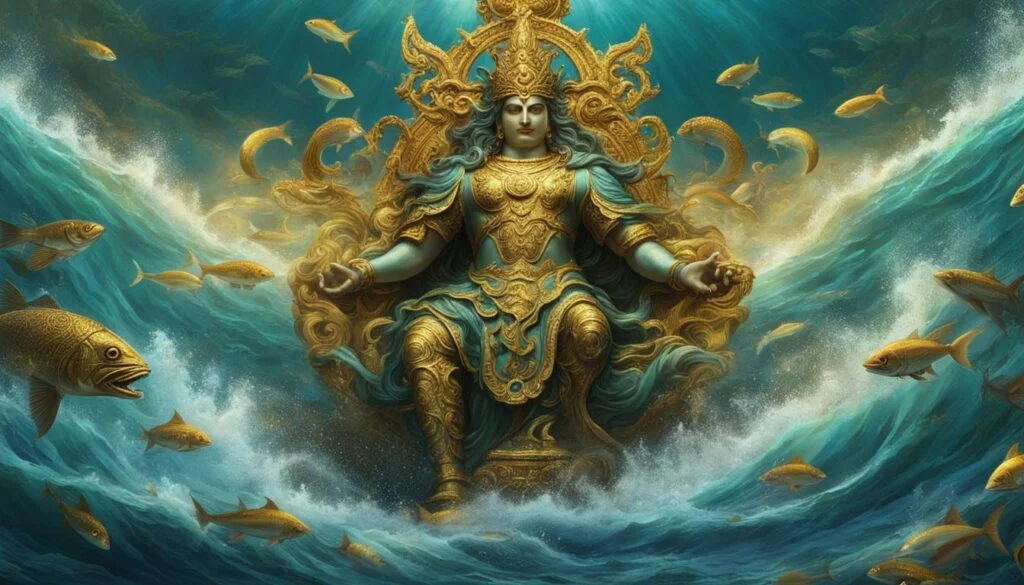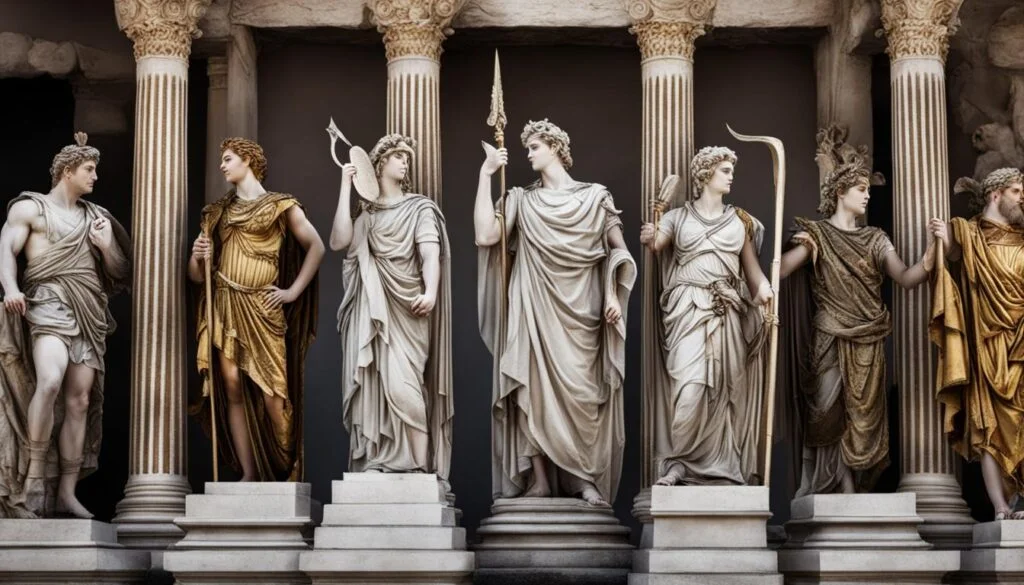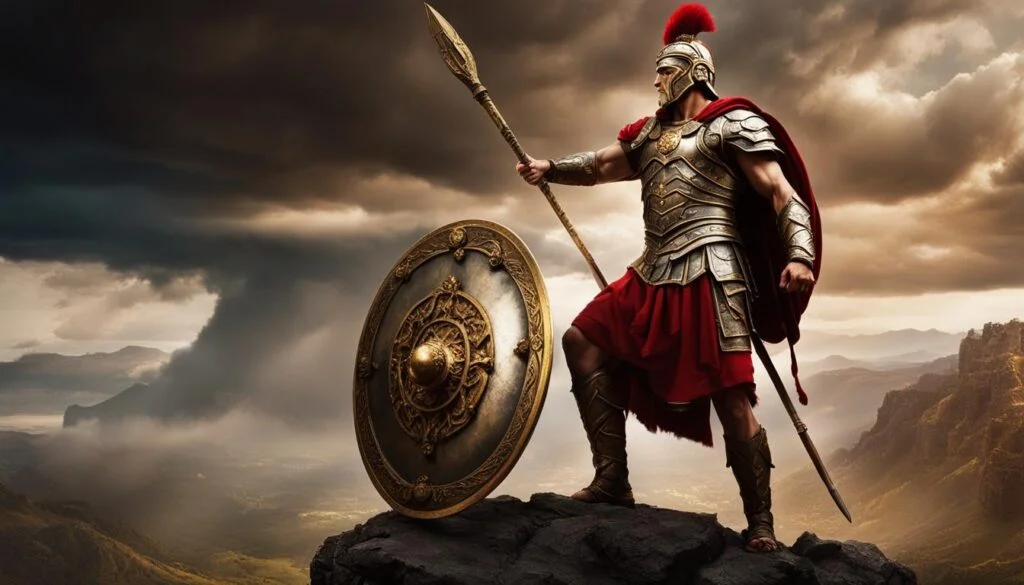Neptune, whose Roman name is Neptune, is the god of freshwater and the sea in Roman mythology.
He is the counterpart of the Greek god Poseidon and holds significant influence over the waters, earthquakes, and storms.
Neptune is often depicted with symbols such as a trident, horse, and dolphin, showcasing his power and connection to the sea.
In ancient Rome, Neptune was worshipped in festivals and temples, cementing his role as one of the chief Olympian deities.
Key Takeaways:
- Neptune is the Roman god of freshwater and the sea, equivalent to the Greek god Poseidon.
- He possesses power over the waters, earthquakes, and storms.
- Neptune is often depicted with a trident, horse, and dolphin.
- He was worshipped in various festivals and temples in ancient Rome.
- Neptune’s significance extends beyond the sea, as he is associated with agriculture and fertility.
The Origins of Neptune and Poseidon
Neptune and Poseidon are two gods from different mythological traditions but share striking similarities.
Neptune is the Roman counterpart of the Greek god Poseidon. They are both associated with the sea and its powers, and they hold dominion over the realms of heaven, earth, and the seas.
In both Roman and Greek mythology, Neptune/Poseidon is depicted as a powerful and often tempestuous god, capable of controlling the waters, causing earthquakes, and even challenging the authority of other gods.
Despite their separate origins, the stories and attributes of Neptune and Poseidon often overlap, emphasizing their importance in ancient mythological beliefs.
Neptune, the god of freshwater and the sea in Roman mythology is the equivalent of Poseidon, the Greek god of the sea.
Both deities are renowned for their control over the waters, displaying their dominance over the natural elements.
Neptune is often depicted carrying a trident, a symbol of his power and authority, just like Poseidon.
Their representation as mighty sea gods reflects their control over the vast ocean and the ability to summon storms and earthquakes at will.
While Neptune and Poseidon have distinct cultural origins, their similarities highlight the shared belief in the power and influence of these deities across ancient civilizations.
The significance attributed to Neptune and Poseidon as gods of the sea underscores the importance of the ocean in the lives and beliefs of ancient peoples.
Depictions of Neptune in Art and Mythology
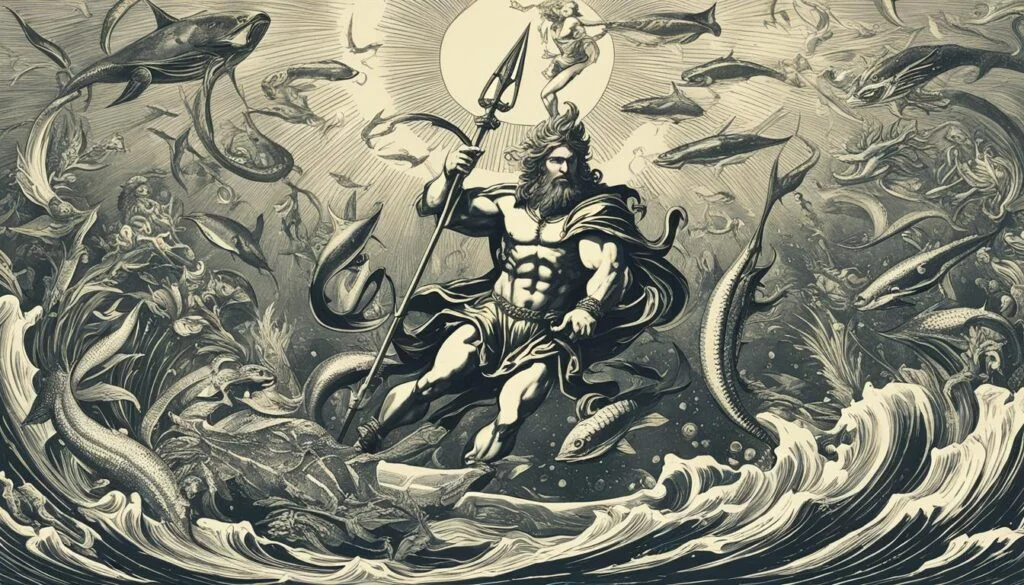
Neptune, a prominent figure in Roman mythology, is frequently depicted in ancient art and mythological stories.
These depictions showcase Neptune’s image and significance, highlighting his role and attributes in the ancient Roman culture.
In the realm of art, Neptune is often portrayed as a majestic and powerful god.
One common depiction shows him riding in a sea chariot, pulled by seahorses or dolphins.
This imagery symbolizes his dominion over the sea, emphasizing his connection to the vast waters.
Another prominent feature in Neptune’s portrayal is his trident, a three-pronged weapon that represents his control and authority over the ocean’s depths.
The trident is a prominent symbol of Neptune’s power and is commonly associated with his mythology.
Notably, Neptune is also associated with freshwater springs, which further highlights his significance in both the sea and inland waters.
Some depictions of Neptune showcase his presence in these freshwater sources, underscoring his diverse domain and influence.
Neptune’s depiction in ancient art is heavily influenced by Hellenistic conventions, particularly in Roman mosaics found in North Africa.
These mosaics feature intricate designs and portray Neptune in various scenes, further enriching the mythology surrounding him.
Mythological stories involving Neptune often focus on his relationships with other gods and mortals.
These tales showcase his influence and role in shaping the world of ancient mythology.
Neptune’s interactions with other deities and heroes highlight his power over the sea and his ability to cause storms or calm the waters based on his disposition.
Worship and Festivals of Neptune

Neptune, the Roman god of the sea, was highly revered and worshipped by the ancient Romans through various festivals and temple dedications.
One of the prominent festivals dedicated to Neptune was the Neptunalia, which took place during the peak of summer.
This vibrant celebration honored Neptune as the deity of water sources, particularly during times of drought and intense heat.
During the Neptunalia, participants gathered in a serene wooded area located between the Tiber and Via Salaria.
Seeking relief from the scorching summer temperatures, they indulged in the refreshing combination of spring water and wine.
The festival became a delightful occasion for merrymaking, fostering social connections and temporarily breaking societal constraints.
Neptune’s religious significance is further exemplified by the presence of temples devoted to his worship.
In Rome, the city that held Neptune in high regard, there was only one temple dedicated to him.
Situated near the Circus Flaminius in the Campus Martius, this ancient structure dates back to at least 206 BC.
However, it was later replaced by the Basilica Neptuni, which was dedicated by Agrippa to commemorate a naval victory.
- Neptune was worshipped in the Neptunalia festival, held during the summer.
- Participants gathered in a wooded area between the Tiber and Via Salaria to seek relief from the heat.
- The festival was a time of merrymaking and social mingling.
- Neptune had only one temple in Rome, near the Circus Flaminius in the Campus Martius.
- The temple dates back to at least 206 BC and was later replaced by the Basilica Neptuni.
Neptune as a God of Agriculture and Fertility

While Neptune’s primary domain is the sea, he also holds significance in agriculture and fertility.
Like Poseidon, Neptune was worshipped by the Romans as a god of horses, making him the patron of horse racing.
In addition, Neptune was associated with agricultural fertility and was recognized as the legendary progenitor god of the Falisci, a Latin tribe.
This connection to fertility is further exemplified in the Neptunalia festival, which involved the offering of a bull as a sacrifice.
The festival celebrated Neptune’s role in ensuring agricultural abundance and prosperity.
Participants would gather to honor Neptune’s influence and seek his blessings for a fruitful harvest.
The similarities between Neptune and Poseidon, such as their shared association with horses, emphasize their common domains of the sea, agriculture, and fertility.
Both gods were revered by their respective cultures for their ability to bestow blessings and ensure the prosperity of both land and sea.
Neptune’s Consorts and Offspring
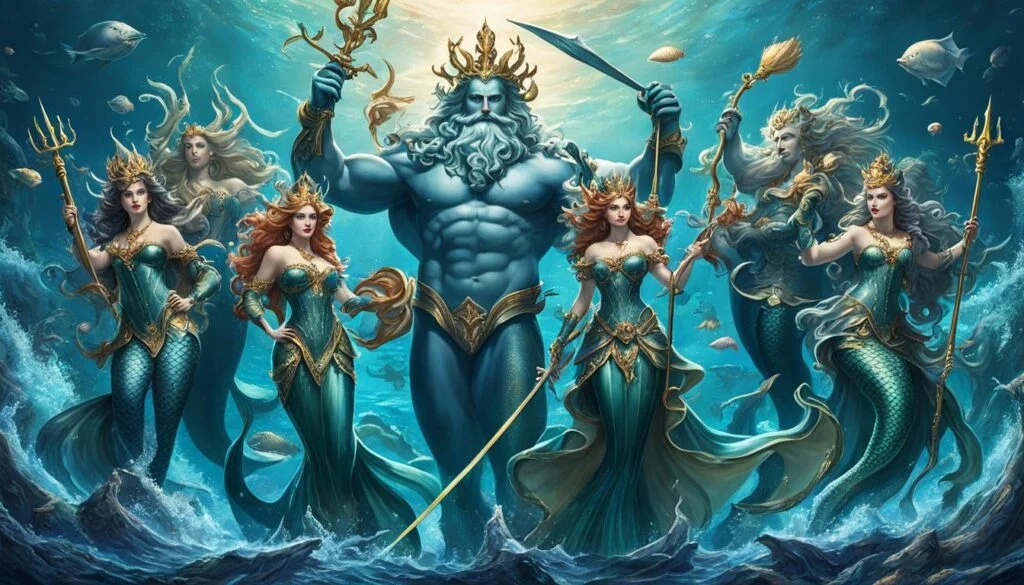
Neptune, the Roman god of freshwater and the sea, had various consorts and offspring in Roman mythology.
His primary consort was Salacia, whose association with the sea brought forth waves to the shore.
Neptune’s children were diverse and intriguing. One of his well-known offspring was Triton, a merman who served as his messenger.
Additionally, Neptune fathered numerous sons who possessed extraordinary qualities.
Some were strong and brutal men, while others took on monstrous forms.
The Romans believed that Neptune fathered these children through various partners, mirroring similar myths found in Greek mythology.
This connection further emphasizes the similarities between Neptune and his Greek counterpart, Poseidon, who also had a multitude of consorts and offspring.
To better understand Neptune’s family tree and the complex relationships within Roman mythology, refer to the table below.
Neptune’s Consorts and Offspring:
- Salacia: Primary Consort
- Triton: Messenger and Son
- Other sons: Known for their strength, brutality, or monstrous forms
Neptune’s extensive family tree highlights his significance and influence in Roman mythology.
These connections between gods, consorts, and offspring contribute to the rich tapestry of ancient tales and legends.
Neptunus Equestris – The Horse Lord
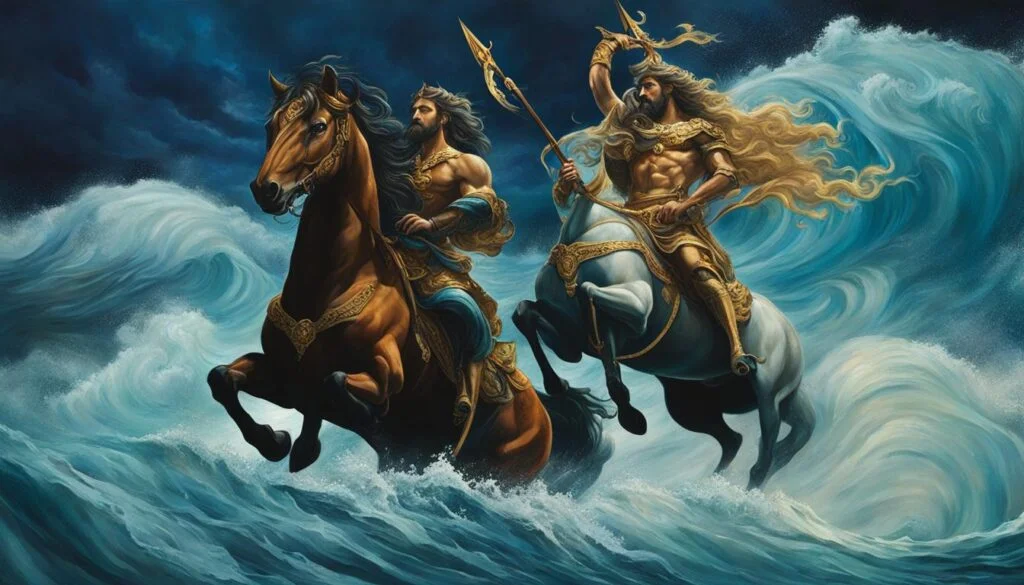
In Roman mythology, Neptune is sometimes referred to as “Neptunus Equestris,” meaning “horse lord.”
This title emphasizes his association with horses and horsemanship. In ancient Rome, Neptune was worshipped not only as a god of the sea but also as a patron of horse racing, a popular form of entertainment.
This aspect connects Neptune and Poseidon, both of whom share a connection to horses in their respective mythologies.
The association with horses further highlights Neptune’s power and influence beyond the sea domain.
In Roman mythology, Neptune holds the title “Neptunus Equestris” and is known as the “horse lord.”
This designation underlines his close association with horses and horsemanship.
In the ancient Roman civilization, Neptune was revered not only as the god of the sea but also as a patron of horse racing, which enjoyed immense popularity as a form of entertainment.
The connection between Neptune and horses establishes another parallel between him and Poseidon, the Greek counterpart.
Their shared affinity for horses underscores Neptune’s influence and power extending beyond his dominion over the sea.
Poseidon in Greek Mythology
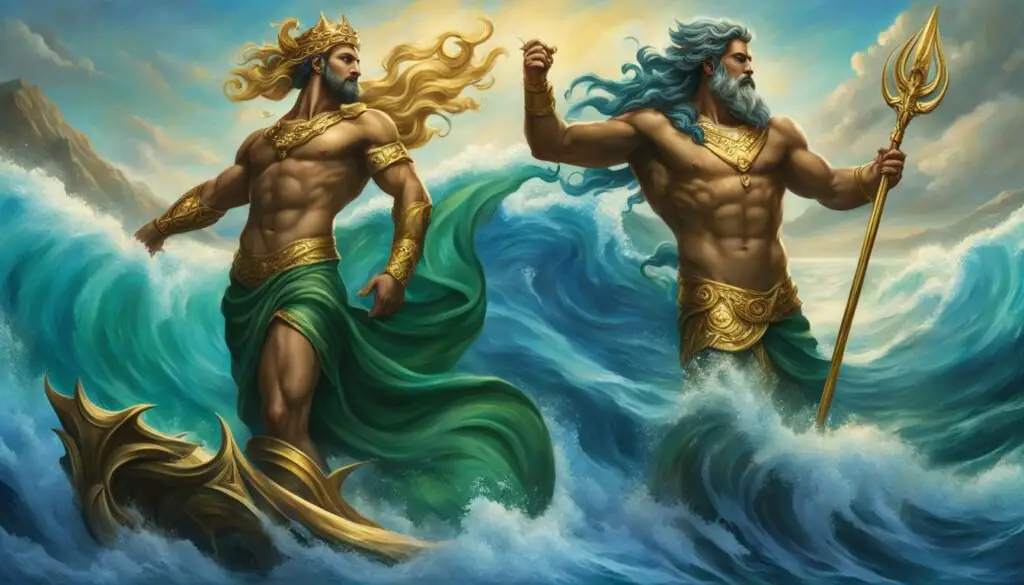
Poseidon, the Greek counterpart of Neptune, holds a significant role in Greek mythology.
He is known as the god of the sea, and protector of waters, and was worshipped particularly concerning navigation.
Like Neptune, Poseidon is associated with earthquakes and is depicted with a trident, representing his power to split boulders and cause tremors.
He is also connected to horses and horsemanship, referred to as the “Hippios” or horse lord.
Poseidon’s influence extended to various city-states in ancient Greece, including Athens and Corinth.
The mythology surrounding Poseidon showcases his unruly nature and his presence in mortal affairs, often challenging other gods.
Despite being distinct deities in their respective mythologies, Neptune and Poseidon share many similarities.
They both rule over the seas, control water sources, and have dominion over earthquakes.
Additionally, both gods are connected to horses and play significant roles in horsemanship.
Similarities and Differences between Neptune and Poseidon
Neptune and Poseidon share numerous similarities due to Neptune being the Roman equivalent of the Greek god.
Both deities hold dominion over the seas, controlling the waters and commanding the power of earthquakes.
Additionally, Neptune and Poseidon are associated with horses and horsemanship, reflecting their importance in ancient mythological beliefs.
However, differences can be found in their specific mythological stories and the extent of their worship within their respective cultures.
Neptune, as a Roman god, was highly revered among the ancient Romans. He was worshipped in various festivals and had a temple dedicated to him in Rome.
In contrast, Poseidon’s worship extended to multiple Greek city-states, particularly concerning navigation and protection of waters.
These variations in worship reflect the nuances of their respective mythological traditions.
Despite these differences, Neptune and Poseidon are often considered interchangeable in terms of their roles and attributes.
Both gods personify the power and mysteries of the vast oceans, symbolizing the immense forces of nature that shape the world.
The stories surrounding Neptune and Poseidon continue to captivate and inspire, resonating with our fascination for the depths of the sea and the relentless power of the tides.
Frequently Asked Questions
Is Neptune a merman?
Neptune is not typically depicted as a merman. In Roman mythology, Neptune is the god of the sea and is usually shown as a powerful man with a trident. He is similar to the Greek god Poseidon.
What is the origin of Neptune?
Neptune originates from Roman mythology and was the god of freshwater and the sea. He was later associated with Poseidon, the Greek god of the sea, and inherited many of his attributes and stories.
What were Neptune’s powers?
Neptune’s powers included control over water, storms, and horses. He could create earthquakes, control the sea’s tides, and influence maritime activities.
Is Poseidon Neptune’s son?
No, Poseidon is not Neptune’s son. Poseidon and Neptune are equivalent deities in Greek and Roman mythology, respectively. They are essentially the same god but with different names and cultural contexts.
What is the god Neptune’s symbol?
Neptune’s primary symbol is the trident, a three-pronged spear. Other symbols associated with him include horses and dolphins.
Which god controls Neptune?
No other god controls Neptune. In Roman mythology, Neptune is one of the major deities with his own domain over the sea. He is part of the Roman pantheon, which includes gods like Jupiter and Mars.
Who was Neptune’s wife?
Neptune’s wife was Amphitrite, a sea goddess and one of the Nereids. She was often depicted alongside Neptune and played a role in various myths.
Who is Neptune vs Poseidon?
Neptune and Poseidon are the same deity in Roman and Greek mythology, respectively. Both are gods of the sea, controlling water and horses, and are depicted with a trident. The main difference lies in their cultural context and the specific myths associated with each tradition.


